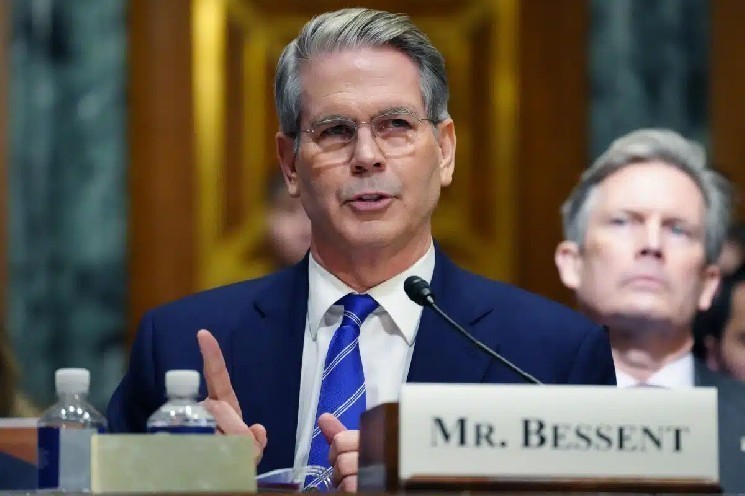Bitcoin’s Resilience Highlighted by Treasury Secretary on White Paper Anniversary
Bessent Draws Stark Contrast Between Cryptocurrency Network and Government Operations
In a significant acknowledgment of cryptocurrency’s staying power, US Treasury Secretary Scott Bessent marked the 17th anniversary of Bitcoin’s white paper with remarks that resonated throughout the digital finance community. His comments, coming amid a contentious government shutdown, emphasized the contrast between traditional governmental systems and the decentralized nature of cryptocurrency networks.
“17 years after the white paper was published, the Bitcoin network is still up and running and more resilient than ever. Bitcoin will never shut down,” Bessent stated in a social media post on platform X. His observation that “Bitcoin never shuts down” served as both a celebration of the cryptocurrency’s longevity and a pointed critique of governmental inefficiencies, particularly directed at Senate Democrats when he added, “Some lawmakers could learn something from this.”
The Historical Significance of Bitcoin’s White Paper
October 31st, 2008 represents a watershed moment in financial history. On this date, an individual or group using the pseudonym Satoshi Nakamoto published a nine-page document that would fundamentally alter conceptions of money, value transfer, and financial infrastructure. The Bitcoin white paper, officially titled “Bitcoin: A Peer-to-Peer Electronic Cash System,” introduced a revolutionary framework for direct financial transactions without traditional intermediaries like banks or payment processors.
The document meticulously detailed how a decentralized ledger system could enable secure peer-to-peer transactions through cryptographic validation rather than trusted third parties. This breakthrough concept addressed longstanding challenges in digital finance, including the “double-spending problem” that had previously necessitated central authorities to verify transactions. Since the network’s launch in January 2009, Bitcoin has operated continuously without interruption – a remarkable achievement that stands in stark contrast to traditional financial systems and government operations that regularly face shutdowns, maintenance periods, and service interruptions.
Treasury Position Signals Evolving Cryptocurrency Policy
Bessent’s anniversary acknowledgment represents more than ceremonial recognition; it potentially signals the Treasury Department’s evolving stance on digital assets under the current administration. Financial analysts and cryptocurrency advocates are interpreting these comments as evidence of a more accommodating regulatory approach toward blockchain technologies and digital currencies. This perspective appears increasingly aligned with competitive international positioning rather than purely domestic regulatory concerns.
The Treasury Secretary’s comments build upon his previous characterization of stablecoins as a “revolution of digital finance” following President Donald Trump’s signing of the GENIUS Act in July. Bessent has consistently advanced the argument that an internet-based dollar system could simultaneously strengthen America’s reserve currency status while expanding global payment access – a position that demonstrates the administration’s recognition of digital financial infrastructure’s strategic importance. This marks a notable departure from previous administrations’ more cautious or restrictive approaches to cryptocurrency innovation.
Resilience as a Defining Characteristic
The uninterrupted operation of the Bitcoin network since its inception represents one of its most compelling features. Unlike traditional financial systems that depend on centralized institutions vulnerable to various forms of disruption, Bitcoin’s decentralized architecture distributes operational responsibility across thousands of nodes worldwide. This design ensures that no single point of failure can compromise the entire system – a principle that extends beyond technical resilience to encompass governance and censorship resistance.
Bessent’s observation about Bitcoin’s operational continuity highlights this architectural advantage during a period when government functions face interruption due to political disagreements. The contrast between a network designed to operate autonomously and systems dependent on political consensus demonstrates fundamental differences in operational philosophy. This resilience factor increasingly appeals to institutional investors and financial strategists seeking stability in an increasingly volatile global economic landscape.
Implications for Digital Finance’s Future
As cryptocurrency adoption continues expanding globally, remarks from high-ranking financial officials like Secretary Bessent take on heightened significance. The Treasury Department’s acknowledgment of Bitcoin’s historical importance and operational reliability suggests an evolving regulatory framework that may increasingly accommodate rather than restrict digital asset innovation. This evolution occurs against the backdrop of international competition, with numerous countries developing central bank digital currencies (CBDCs) and cryptocurrency regulations aimed at capturing economic advantages in the emerging digital economy.
The Treasury Secretary’s comments, while brief, potentially foreshadow a more nuanced approach to cryptocurrency regulation that balances innovation with consumer protection. As traditional financial systems and digital assets continue their convergence, the operational lessons from Bitcoin’s seventeen years of uninterrupted service offer valuable insights for financial infrastructure design. Whether this acknowledgment translates into concrete policy changes remains to be seen, but the symbolic recognition of Bitcoin’s resilience by one of America’s top financial officials marks a notable milestone in cryptocurrency’s journey toward mainstream legitimacy.
This article does not constitute investment advice. Readers should conduct their own research before making financial decisions.














